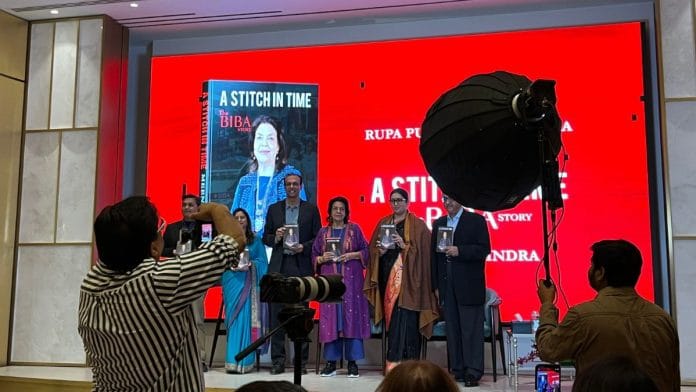New Delhi: Meena Bindra, who created Biba in 1988 –– the clothing brand that became a staple in the wardrobes of urban, upper-middle-class women –– originally wanted some more “spending money”. Her kids were away at boarding school and her husband didn’t make enough money as a civil servant.
“I had a lot of time on my hands. I didn’t play mah-jong. I should earn extra pocket money –– that was my vision at the time,” said Bindra at the launch of her memoir, A Stitch in Time: The Biba Story, published by Rupa Books.
There was no grandstanding, no humbly concealed dreams. But she understood the market. She was one of the women she was designing for. Bindra worked hard. And according to her, she had a bit of luck. At the event, held at the ballroom of DLF Camellias, the audience of which appeared to consist mostly of friends and family –– Bindra and former Textile Minister Smriti Irani held forth on women-led businesses, their version of womanhood, and a fast-fashion brand’s inclusion of handloom.
By the time she was 40, Bindra’s husband was the chairman of a Public Sector Undertaking (PSU) in Visakhapatnam. She lived away from him, running Biba from Mumbai. When she would visit him, his employees used to tell her –– “what are you doing? What is this business? You’re the chairman’s wife. You should enjoy the perks.”
For most of the discussion, Bindra refrained from placing her success in a socio-political context and the socially-sanctioned hurdles that women entrepreneurs are used to crossing. Instead, she focused on her work ethic and her son, Siddharth, who is currently Biba’s managing director. She referred to him as her “secret ingredient”.
But, almost as an afterthought –– “It’s always about the man. People were most disapproving of my lifestyle,” she said.
Also read: The Satanic Verses is the hot new item at Bahrisons bookstore. Khan Market Consensus breaks
Women in business
Bindra and Irani were asked about what lessons young people can learn from her story. The question was swiftly shut down by Irani, who refused to answer.
“There are no lessons for the young, but lessons for society at large,” she said. “The capacity to take an idea to fruition is a story that’s not told enough.”
For women in particular, she continued, the excuses fester through their lives. Each decade of their lives is defined by some patriarchal standard. They’re too young, then they’re supposed to be raising their families. And before you know it, they’ve reached 60 –– “when you might as well be dead.”
Irani held the textile portfolio from 2016 to 2021, wherein she supposedly encouraged brands and boutiques to embrace India’s rich handloom tradition. She recounted an instance in which Siddharth Bindra told her that they would use Ikat, but they needed to see if they could sustain its use.
“Many people meet those in positions of power, but not many speak truth to power,” she said.
What is genuinely impressive is the flair with which Bindra ran a business at a time when it was almost unheard of for women to be at the helm of profitable, large-scale businesses. There was no technology, and she had no way to access what was trending globally, or to use foreign success stories as a template. All she had was grit and a loan of Rs. 8,000.
(Edited by Ratan Priya)







And what exactly is so special about BIBA?
Just another overpriced brand exploiting women folk’s endless love for clothes.
It’s just another brand where the hefty price tags don’t actually translate into financial gains for the artisans and craftsmen. The middleman makes merry off the blood and sweat of others.